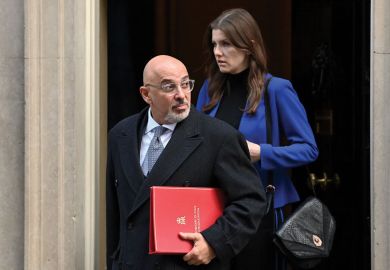There are moments when the magnitude of an event overshadows or overwhelms all else, and the invasion of Ukraine by Russian forces last week was one of them.
The return of war to the European continent has far-reaching consequences, and in our news pages this week we review the picture as far as higher education is concerned.
Our coverage reflects on the stoic response of university leaders in the immediate aftermath of the invasion, the implications for students both in Ukraine and elsewhere, and the longer-term impact that the war may have in realigning global academic collaboration involving Russia in particular.
In recent years there has been a shift in scientific collaboration, in which China and Russia have become much more active bilateral partners, so will this axis be further forged by the heat of Western opprobrium? And if so, could it do anything of significance to the centre of gravity in global higher education? Such questions are not new but are more pressing after the assault on Ukraine.
The sense that Russia’s actions overwhelmed all else was, for higher education watchers in the UK, sharpened by the fact that last week’s invasion coincided with the long-delayed release of the government’s response to the Augar review of university funding in England.
But if you missed any of the detail, fear not: we have news, analysis and commentary, ranging from those relatively reassured by the things that the government has not done (read David Willetts’ take in our opinion pages) to those who see the response as failing both universities and students.
Among those in the former camp is Jo Johnson, former universities minister, who said the student finance package was “perfectly pitched, avoiding a damaging and destabilising fee cut, dealing with the toxic interest rate, and delivering something that is more affordable for the government and taxpayer”. The sector should be under no illusions, he said, that this was “a big win”.
However, he said there was also cause to be “wary” of the consultation on student number controls, the removal of which, he said, had been “the standout levelling-up policy of the last decade”.
An 18-year-old from a disadvantaged background in 2021 is over 80 per cent more likely to enter full-time higher education than was the case in 2010, Johnson said, and in that context number controls should be considered only as “an absolutely last resort to deal with pockets of provision where the OfS sees students getting poor outcomes and the taxpayer poor value for money”.
Others are less reassured. Sir Chris Husbands, vice-chancellor of Sheffield Hallam University, writes in an opinion piece that far from fulfilling Augar’s three-pronged goal of securing a better deal for the student and the taxpayer while ensuring that universities remain on a firm and sustainable financial footing, the proposals pave the way for financial distress for institutions – particularly at a time of high inflation – that is likely to require a further fundamental review.
Even more stark, he argues, is the impact on students and future graduates. “University just got a lot more expensive,” he writes, arguing that this will “deepen already profound generational inequality”.
“The government will contend that this was necessary because the costs of the student loan regime have become 'unsustainable'.
"It is probably also true that the Treasury demanded its price before it would agree funding for newer initiatives, such as the lifelong loan entitlement – which, from 2025, will entitle everyone in England to four years’ worth of student loans over their lifetime.
“But other societies fund their higher education in a range of ways, and few of them with the loaded generational unfairness that seems to be locked in now.”
Locked in or not, much of the commentary from within the sector reflects a sense that, after four years of waiting, this response to Augar represents more of a “sticking plaster” than a long-term fix.
However, Johnson contested this, reiterating that “someone has to pay for higher education, and this seems to have found a sensible balance”.
His own conclusion was to issue a warning for his former colleagues in government not to interfere in allowing students to make their own decisions about whether, what and where to study, and to trust in the high quality bar imposed and enforced within English higher education.
“What we must avoid is a Tory ‘Gosplan’ of trying to work out what subjects are strategic, a Tory workforce management approach,” he said, “because there is no evidence that anybody is any good at this.”
Register to continue
Why register?
- Registration is free and only takes a moment
- Once registered, you can read 3 articles a month
- Sign up for our newsletter
Subscribe
Or subscribe for unlimited access to:
- Unlimited access to news, views, insights & reviews
- Digital editions
- Digital access to THE’s university and college rankings analysis
Already registered or a current subscriber?




